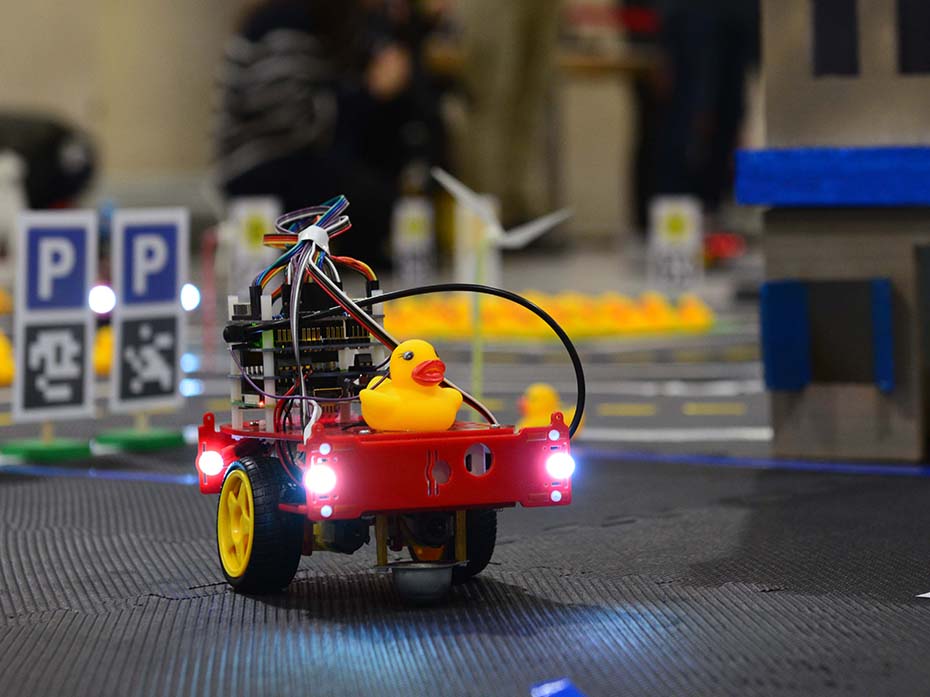Dream job: Robotics
How do you fulfil your career aspirations? With the semester about to begin, Andrea Censi tells us how he managed to find an occupation in the field of self-driving cars.
I always wanted to program robots as a child, and I am lucky that I do exactly that today. But back then I wasn't thinking about self-driving cars. I imagined that my robots would look like the golden humanoid C-3PO from Star Wars, with clumsy arms and a robotic voice. Autonomous cars don't have arms and they don't talk much. They say "welcome" when you get in and "goodbye" when you get out, but for the rest of your journey they are quiet. In fact, the best outcome for us designers is that the passenger doesn’t even notice that the car is self-driving - unless they see the empty driving seat.

I am lucky to have found a double occupation that fascinates me and has a positive impact. As a researcher at ETH Zurich and Director of Research at Nutonomy1, I play with robots all day, and at the same time I am helping to make the roads of the future safer for everyone. But how did I end up here from my childhood dream? Here is a little guide for everyone who would like to become a roboticist.
Start with math and physics
If you want to build robots, you don't primarily need a screwdriver, but solid foundations of mathematics and physics. Those solid foundations will make it possible for you to advance to the advanced topics, such as control theory, machine learning, and artificial intelligence.
And don’t forget to delve into computer science and learn about software development—millions of lines of code are necessary to make a robot behave intelligently. Elegant formulas are useless if you cannot translate them into code.
Nothing works without a sound education. Congratulations, by the way, if you are about to start your studies at ETH in mid-September. Here you’ve come to the right place!
Discover that theory and reality are not the same
After you have solid foundations, reach for a real robot as quickly as possible! You will discover that theory and reality are not the same. As a Bachelor’s student, I got my first field experience at the Robocup competition. I discovered that the main problem with robots is that the batteries are never charged when you need them. And my first job was to charge the batteries. (It took me ten years to delegate this issue.)
At ETH Zurich there are many laboratories that offer many possibilities to work with real robots, from Bachelor’s to Master’s and doctoral theses, especially in the Department of Mechanical Engineering. Here you are sure to find something that interests you: with and without arms, with legs, on wheels, flying with propellers – whichever you like!
Female robotics experts wanted!
Half of the talent in the world belongs to women, but unfortunately they are still the minority in robotics. This is a pity: robots will be pervasive in society, and we need everybody’s perspective (and all the talent!).
The women roboticists I have met are great: women like ETH’s own Professor Margarita Chli or luminaries like Professor Daniela Rus from MIT or Professor Radhika Nagpal, who is doing research at Harvard. And then there is the younger generation: for example my Nutonomy colleague and planning expert Nok Wongpiromsarn, or Valeria Cagnina2, a successful entrepreneur at only 16 years old.
They are all excellent examples that there are already women who can decisively influence robotics. Future female roboticists are explicitly wanted at ETH!
Duckietown – everybody can learn robotics

If you aren’t just about to start your studies, but are perhaps thinking about it for next year, you can still get a taste of robotics. At ETH Zurich, we are developing Duckietown3, an open source platform that can help everybody enter the world of robotics. Even if you are not studying at ETH Zurich, you can read our lectures. You can experiment with the same code and materials that our students use in the Autonomous Mobility on Demand and Control Systems courses. And of course you can also discuss in our online forums. So you can help us to develop safe self-driving cars, or the generation of robots after the self-driving cars. Maybe they'll even have arms.
References
1 external page Nutonomy
2 external page Article about Valeria Cagnina
3 The external page Duckietown project. see also this article in ETH News.